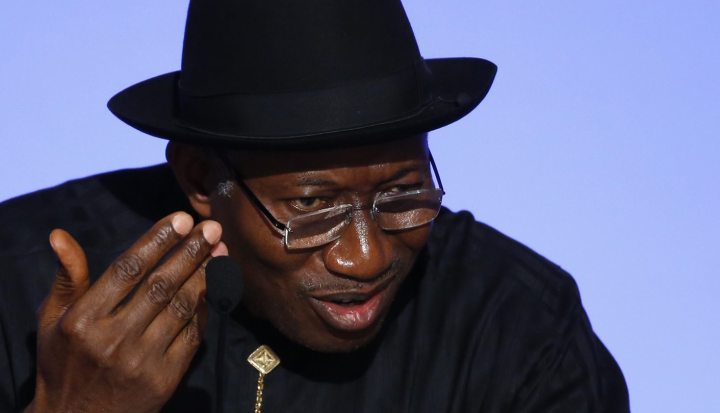Africa
Analysis: Goodluck Jonathan and a billion dollars of bad judgment

Nigerian President Goodluck Jonathan wants another $1 billion to funnel into his army, hoping that this will succeed where everything else has failed against Boko Haram. Here’s the thing, though – he hasn’t actually tried anything else except the military approach. And if we know one thing beyond reasonable doubt, it’s that the strong arm tactics don’t work. By SIMON ALLISON.
Goodluck Jonathan cuts a somewhat forlorn figure in public these days. The year 2014 was meant to be a good year for Nigeria, and a good year for its president in the run-up to elections in 2015. This was the year that Nigeria finally overtook South Africa to become Africa’s biggest economy, a development that should have kick-started a new investment boom in what is still, despite the impressive stats, an underperforming market.
But Boko Haram had other plans. The Islamist militant group, already known for its brutality, has been more violent than ever this year. It’s not just those kidnapped girls – since January, more than 2000 people have died at the hands of Boko Haram members or people acting in the group’s name (this distinction is not always clear, but exists).
Nothing that Jonathan has done – or anyone else for that matter – has seemed to make the slightest of difference. A huge military crackdown last year was an unmitigated failure, only serving to push Boko Haram towards more vulnerable targets, such as schools and villages. A state of emergency in several northern states – so extreme that at one point cellphone networks were disabled – was ineffectual, inconveniencing ordinary citizens more than militants. A well-meaning but ultimately dangerous Twitter campaign still has not #BroughtBackOurGirls.
While losing the war on the ground, President Jonathan is also losing the public relations war. His popularity at home has taken a nosedive, with certain constituencies unimpressed with his continued struggles to stem the violence. His popularity abroad, meanwhile, has never been lower. In fact, things have got so bad that the Nigerian government has hired a fancy US PR firm – with an equally fancy retainer – to polish his and Nigeria’s international image. Ironically, even this backfired.
So it’s back to the drawing board for Jonathan and his band of young, well-educated advisors. They need a new plan, and quickly. Fortunately, they’ve got one.
Last week, President Jonathan approached parliament with an extraordinary budget request.
“I would like to bring to your attention the urgent need to upgrade the equipment, training and logistics of our armed forces and security services to enable them to more forcefully confront this serious threat,” wrote Jonathan in the letter to parliament, before asking permission from legislators to seek a $1 billion loan, presumably from western donors, to improve Nigeria’s military capabilities. (This is in addition to the $6 billion that the military and security services receive annually.)
This, then, is Jonathan’s new strategy – more money, more guns, more bullets and, inevitably, more fighting.
It didn’t take Nigeria’s political opposition – in the form of a new opposition coalition that poses the most serious threat ever to the ruling party’s electoral hegemony – to register their disapproval with Jonathan’s proposal, which really just guarantees more of the same failed tactics.
“The only reason the schoolgirls have remained in captivity is the sheer cluelessness and incompetence on the part of the Jonathan administration,” said Lai Mohamed, executive secretary of the All Progressives Congress. “Therefore putting more money in the hands of an incompetent and massively corrupt administration can only encourage more incompetence and corruption.”
Mohamed has a point. There’s also the Nigerian armed force’s previous record to consider. Not only have they so far failed to effectively combat Boko Haram, but military units have regularly been implicated in serious human rights violations, including massacres of civilians, summary executions and unlawful detention – exactly the kind of crimes they are supposed to be preventing.
“Many people I have met with during this visit openly acknowledge human rights violations have been committed by the security forces,” the UN High Commissioner for Human Rights, the South African Navi Pillay, said during a fact-finding expedition to Nigeria in March. “These have served to alienate communities and create fertile ground for Boko Haram to cultivate new recruits.” In other words, far from helping, the heavy-handed military response is actually making things worse.
There are better things that Nigeria could do with $1 billion. A couple of suggestions: how about investing in better investigative and prosecuting capacity, so that people who murder and maim can be detained and imprisoned through the criminal justice system? A slow process, sure, but one that upholds the rule of law and might not incite another generation of would-be terrorists. Or perhaps it could be put towards health, education and infrastructure in northern Nigeria? This would address the underlying issue that makes Boko Haram’s message so potent, namely the the dramatic development inequality that exists between northern and southern Nigeria.
Or perhaps, as the APC’s Mohamed observed, Nigeria shouldn’t be asking for any more money at all. Instead, the government should be trying to plug the $20 billion hole in state finances from missing oil revenue.
Parliament has yet to respond to Jonathan’s proposal, and won’t for another two months – not until it returns from recess. In that time, perhaps the cool heads would prevail and legislators will realize the folly of repeating all the mistakes of the past. DM
Photo: President of Nigeria Goodluck Jonathan attends a press conference at the end of the Paris Summit for Security in Nigeria, at the Elysee Palace, in Paris, France, 17 May 2014. This summit follows the kidnapping of more than 200 Nigerian school girls by Islamist group Boko Haram in Nigeria, threatening to sell them as slaves. EPA/CHRISTOPHE KARABA


















 Become an Insider
Become an Insider